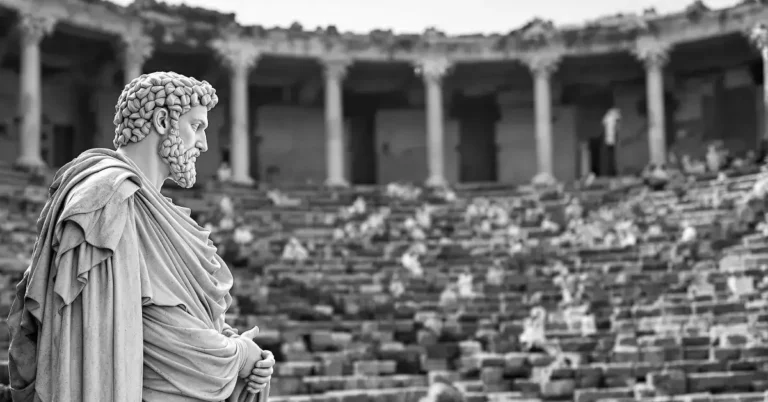The daily planner is not just about scheduling – it’s about intentional living. This quote is a common sentiment among productivity enthusiasts and can also be attributed to modern Stoic philosophers. Studies show that people who use daily planners are 42% more likely to achieve their goals, but when combined with Stoic principles, these tools become even more powerful. Ready to turn your daily planner into a catalyst for personal transformation? Let’s see how ancient wisdom can revolutionize your modern planning practice.
Why Your Daily Planner Needs Stoic Philosophy?
A truly effective daily stoic planner isn’t just another calendar with inspirational quotes – it’s a thoughtfully designed tool that embodies the core principles of Stoic philosophy while meeting modern productivity needs. Let’s explore the essential elements that separate exceptional stoic daily planners from basic journals.
Choosing the Perfect Daily Stoic Planner
At its heart, a stoic daily planner should reflect the fundamental teachings of Stoicism. The most effective ones incorporate Marcus Aurelius’s emphasis on morning reflection and evening review – a practice he detailed in “Meditations.” These planners typically include dedicated spaces for practicing premeditatio malorum (premeditation of adversity) and dichotomy of control exercises.
A standout stoic daily planner guides you through three critical daily questions:
- What is within my control today?
- What virtues can I practice in upcoming situations?
- How can I prepare for potential challenges?
Daily Planner Setup: The Stoic Morning Routine
The best stoic planners include several distinctive features that set them apart:
- Morning and evening reflection prompts that encourage deep thinking about your actions and choices
- Virtue tracking systems that help you monitor your adherence to stoic principles like wisdom, justice, courage, and temperance
- Dedicated spaces for negative visualization exercises
- Goal-setting frameworks that emphasize process over outcomes
- Areas for practicing gratitude and maintaining perspective
- Weekly or monthly virtue focus sections
- Space for memento mori reflection

Difference Between Traditional and Stoic Planners
While traditional planners focus primarily on scheduling and task management, stoic planners take a more holistic approach to daily planning. Traditional planners might help you organize your day, but a stoic planner enables you to examine why you’re doing what you’re doing and whether it aligns with your values.
Traditional Planner Focus:
- Time blocking
- Task lists
- Appointment scheduling
- Goal tracking
Stoic Planner Focus:
- Value alignment
- Character development
- Ethical decision-making
- Emotional resilience
- Perspective maintenance
- Virtue practice
How to Plan in a Planner
Transform your daily planning with proven stoic methods!
Start each morning with intention by writing three potential challenges you might face today – this simple practice of negative visualization keeps you prepared yet optimistic.
Block your most important tasks during your peak energy hours, and always leave space for unexpected obstacles.
End each day by reflecting on what was within your control and identifying one virtue you successfully practiced.
Remember, effective planning isn’t about perfection – it’s about progress and practical wisdom!
Psychological Benefits of Stoic Planning Approaches
Research in positive psychology supports many of the benefits associated with stoic planning methods. Regular use of a stoic daily planner can lead to:
- Increased emotional regulation through daily reflection practices
- Enhanced resilience by preparing for adversity
- Greater sense of purpose through alignment with personal values
- Reduced anxiety about external circumstances
- Improved decision-making through systematic evaluation of choices
- Better stress management through perspective-taking exercises
- Heightened self-awareness and metacognition
The key to finding value in a stoic planner lies not just in its features, but in how consistently you engage with its prompts and exercises. The best planner for you will be one that you’ll actually use daily, that challenges you to grow, and that helps you maintain focus on what truly matters in your life.
When selecting a stoic planner, consider its features and how well it aligns with your current lifestyle and planning needs. The ideal planner should feel like a natural extension of your daily routine while gently pushing you toward deeper philosophical engagement with your day-to-day experiences.
Your Daily Planner Guide: Stoic Journaling Prompts
Watch on our YouTube Channel!
Dive deeper into your Stoic practice of journaling with our bite-sized YouTube videos! In these short videos, we break down practical journaling prompts inspired by Marcus Aurelius, Epictetus, and Seneca. From morning reflection routines to evening virtue tracking, our channel brings ancient wisdom to your daily planning practice. Already using these prompts? Please share your journey in the comments below our video! → Click here to watch our Stoic Journaling videos and transform your daily reflections. Don’t forget to subscribe and hit the notification bell to stay updated!









